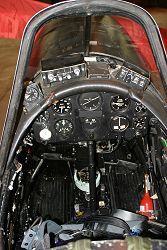|
|
|

de Havilland Chipmunk

The De Havilland
Chipmunk is a fully aerobatic two seat training aircraft, and was the
standard, post-war primary trainer for the RAF, ARMY and NAVY.
The RAF received 735
Chipmunks manufactured in the UK. The first to wear RAF roundels were
flown by the Oxford University Air Squadron from February 1950;
thereafter, the type replaced the Tiger Moth with all 17 university air
squadrons, as well as equipping many RAF Volunteer Reserve flying schools
in the early 1950s. National service pilots underwent their initial
training on the Chip, which served intermittently at the RAF College,
Cranwell.
A few Chipmunks of No, 114 Squadron were pressed into service in Cyprus on
internal security flights during the troubles of 1958.
Under an agreement
concluded between de Havilland and the General Aeronautical Material
Workshops (OGMA) of Portugal 60 Chipmunks were licence-manufactured from
1955 for the Portuguese air force, and the type was still being operated
by this service until replaced in 1989. Other users included Burma,
Ceylon, Chile, Colombia, Denmark, Egypt, Eire, Iraq, Jordan, Lebanon,
Malaya, Saudi Arabia, Syria, Thailand and Uruguay.


|
de Havilland Chipmunk T10 Specifications
|
|
Engines:
Gypsy Major MK 8
Speed:
173kts (Max) 90kts (Cruise)
Endurance:
18 gallon fuel tank giving 3 hours of duration
MAUW (Max all up weight):
2100 lbs
Display Weight:
1861 lbs
Dimensions:
25’ (Length) 34’(Width)
Capacity:
Pilot + 1
|
|
|
